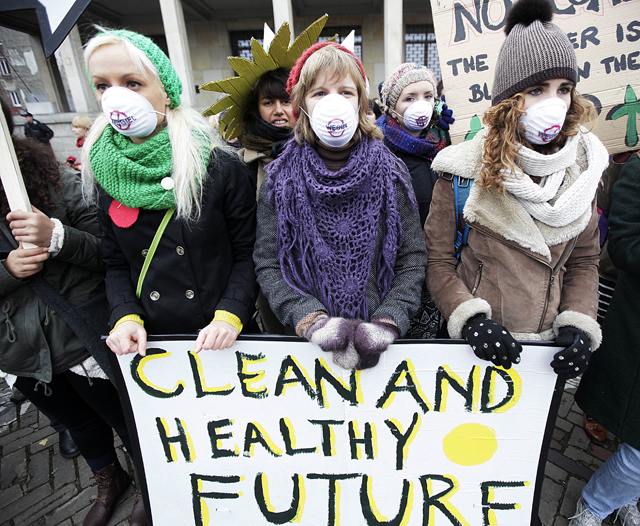This post first appeared in YES! Magazine.

Young girls protest in front of the Polish Ministry of Economy in Warsaw, Monday Nov. 18, 2013. (AP Photo/Czarek Sokolowski)
I’m sitting here in a convergence space in downtown Warsaw, about a mile or so from the National Stadium, where for the last two weeks negotiators from around the world have failed to make any significant progress in the latest round of UN Climate Talks.
Next to me, Evelyn Araripe, an activist and journalist here with the Brazilian group Viração, is working on a recap of the day’s events. Across the room, a group of young people with Friends of the Earth are planning their activities for the coming days. Downstairs, people are plotting out different ideas for videos and interviews they want to conduct tomorrow.
This is where the real work of solving climate change is happening: in a slightly rundown, old building just off the main shopping street here in Warsaw. Our setting lacks the orderliness of the sterile plenary halls over at the 19th Conference of the Parties, but it’s abuzz with creativity and determination.
Especially right now. It’s been just a few hours since much of civil society marched out of COP19 to protest the lack of progress at the talks. Of particular concern were the moves by big polluters like Australia and Japan to drop their commitments to cut emissions, the lack of finance on the table for developing countries, and the corporate takeover of a process that is supposed to represent the voices of people around the world.
Not only did our Polish government hosts allow for corporate sponsors to slap their logos all over the meetings, they went so far as to partner with the World Coal Association to host a major coal summit alongside the climate talks this week. It was the equivalent of throwing an arms fair next to a world peace conference — and naturally, it drew quite a bit of protest.
So on Thursday, with t-shirts reading “Polluters Talk, We Walk,” some of the world’s largest environmental organizations — Greenpeace, Oxfam, Friends of the Earth, 350.org, etc. — joined with development groups like ActionAid, labor networks like the International Trade Union Confederation, movements across the Global South like the Pan-African Climate Justice Alliance, and young people from around the world, to walk out on the conference.
The walk-out was a condemnation of these particular talks, not the entire UN process. The back of our shirts read “Volveremos,” Spanish for, “we’ll be back,” stronger and more powerful than ever before.
We haven’t given up hope on the UN climate negotiations, but these meetings were a particular travesty, and we know that they won’t make significant process until we can stand up to the fossil fuel industry and break their stranglehold over our governments and economies.
The breadth and scope of Thursday’s walkout was an unprecedented development in the UN process. Individual groups have marched out of UN climate negotiations in the past (I’ve lost track of how many times groups like Friends of the Earth or 350.org have marched, protested, or gotten kicked out of meetings). But never before have so many groups, from giant NGOs like the World Wildlife Federation to people’s movements from across the Global South, marched out together with a unified voice. Thursday’s action was a small one — walking out of a conference — but it signified a new level of unity in the global climate movement.
And we know we’re not alone. Right now, photos are already coming in from “We Stand With You” vigils taking place around the world to honor the victims of Typhoon Haiyan and call for immediate climate action.
This is the seventh annual UN climate conference I’ve been to and it’s hard not to be massively depressed about the entire process. Progress is slow, things fall apart. And yet, something about this year feels different.
For the first time, it feels like we really know who our enemies are. It’s the fossil fuel industry, and from divestment campaigns to stopping pipelines, we’re beginning to go after them in a serious way.
Climate change is a difficult fight, but sitting in rooms like this one, surrounded by activists from around the world who are pledging their hearts and lives to this struggle, it’s hard not to feel optimistic. As Bill McKibben often says, I’m not sure that we’re going to win, but we’re going to put up one hell of a fight.


